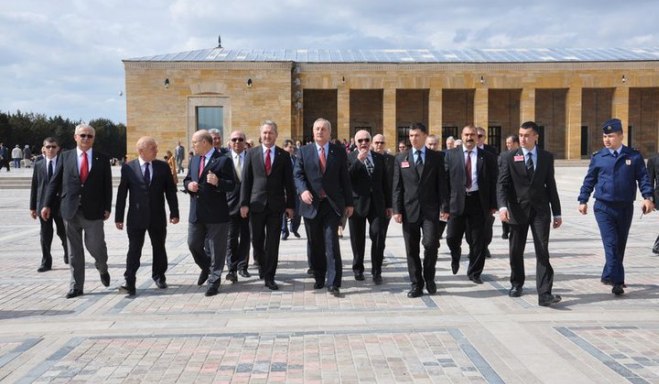Abkhazian President Bagapsh in Ankara, by Hasan Kanbolat

Abkhazia's President Sergei Bagapsh visited Anitkabir in Ankara
Today's Zaman
On April 7 at 11 a.m. Abkhaz President Sergei Bagapsh arrived in Ankara on a private plane from Sochi.
The delegation that arrived with Bagapsh included Principal Clerk to the President Grigoriy Enik, Foreign Minister Maksim Gunjia, Economic Minister Kristina Özgan, President of the Central Bank İlarion Argun, MP Talih Hötiş, Consultant to the President Sariya Amıçba, Manager of Protection for the President Andrey Bobua, World champion wrestler Denis Sarguş, Abkhazian State University Rector Aleko Gvaramiya, First Assistant to the Principal Clerk of the Presidency Zurap Kacaya, Protocol Director for the Presidency Alik Logua, Special Residence Director İbrahim Ayüzba, Assistant to the Press Spokesperson for the Presidency Alhas Çolokua, Zurap Kocayaoğlu, Tayfun Ardzınba, Tamaz Logua, Vaja Çaçba, Beslan Yeşba, State Returns Committee head Zurap Adleyba, President of the Agricultural Chambers Leonid Osia, Yazar Anatoliy Logulaa, Astanda Ketsba from Abkhazian State Television and Robert Alamia.
Bagapsh had a series of meetings scheduled immediately after he arrived in Ankara, and on the evening of April 7 was the guest of honor at a dinner held by the Association of Businessmen from the Caucasus (KAFIAD). On the morning of April 8 Bagapsh had a breakfast meeting with journalists at the Ankara Swissotel. As for the rest of his visit, Bagapsh is expected to join in festivities held in his honor by ethnically Abkhaz Turkish citizens on March 9 at the Adapazarı village of Uzuncaorman. On the same night, the Abkhazian president is expected to attend a dinner at the Green Park Hotel in Taksim. Following a press conference on March 10, Bagapsh is expected to return to Abkhazia.
While there has been a certain effort to portray the reasons behind Bagapsh’s visit as both “therapy for a herniated disc” and “meetings with ethnically Abkhazian Turkish citizens,” the truth of the matter is that this visit is clearly one of the steps being taken in the softening of Turkish policies towards Abkhazia.
One of the first steps within this framework was Turkey’s prevention of Georgian seizures of Turkish ships headed on Black Sea international waters for Abkhazia.
Ankara thus saw to the freeing of all the ships seized by Georgia (with the exception of the Afrostar). The second step was the developments that started taking place in terms of bettering both human and trade relations between Turkey and Abkhazia. Alongside all this, the Turkish Foreign Ministry is trying to prevent any possible spread of the perception that the visit by Bagapsh to Ankara is some sort of step in opposition to the unity of Georgian soil. It is thus searching for ways to develop and improve relations with Abkhazia without damaging relations with Georgia, and, thus, with the approval and knowledge of Tbilisi in all of this. To wit, an April 7, 2011 published statement from the Turkish Foreign Ministry, titled “Regarding Sergey Bagapsh’s Visit to Turkey,” works to underscore the ties of friendship between Turkey and Georgia. In fact, while the statement uses the name “Georgia” four times, it never even mentions the name “Abkhazia.” The statement does not even go so far as to mention from which country or region Bagapsh comes.
And so, while Turkey wants to protect the territorial integrity of Georgia, it also wishes to see its trade, cultural and human relations with Abkhazia develop. This is because there can be no outcome from Georgia’s current policies towards Abkhazia other than to push Abkhazia to have closer relations with the Russian Federation. Turkey has around four times as many ethnically Abkhaz citizens as there are actual Abkhaz living in Abkhazia. In Abkhazia, there is a population of Turks left over from Ottoman times. In addition, there are strong and deep linguistic, religious, cultural and historical ties between Turkey and Abkhazia. Abkhazia does not perceive Turkey as being a different country or some sort of close relative, but instead sees Turkey as part of its own family, and as a large piece of a wider union. For this reason, the relations between Turkey and Abkhazia go well beyond trade relations and are in fact based on very close human relations. It is in this vein that they will continue to develop.
It is necessary for all to understand that in order to bring about stability, security and peace in the Eastern Black Sea region, strong human relations, first and foremost, must be formed.
Source: Today's Zaman